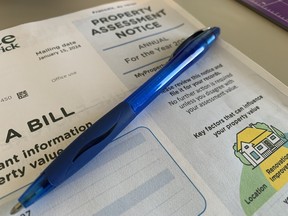Almost 10,000 property assessment appeals filed with province
N.B. sees largest number of requests for review since 2017 tax scandal

Article content
Almost 10,000 property assessment appeals have been lodged with Service New Brunswick, representing the largest number of requests for review the Crown corporation has received in a single year since the 2017 property tax scandal.
New Brunswick property owners had until Feb. 14 to file a request for review of their 2024 assessment. These assessments were mailed out by the province in January, with a warning that nine out of every 10 owners could expect to see a rise in the assessed values of their properties.
To date, Service New Brunswick – the organization responsible for assessing properties in the province – has received 9,863 requests for assessment reviews, including inquiries, with 8,593 of those proceeding to formal reviews, according to spokesperson Jennifer Vienneau.
That’s up almost 10 per cent from the year prior.
According to its own data, Service New Brunswick saw 8,971 requests for review in the 2023 taxation year, with 7,934 of those proceeding to formal reviews. Over the last decade, the number of requests has fluctuated from a low of 3,956 in 2018 to a high of 18,593 in 2017 – the latter the year where the Brian Gallant government came under fire for fast-tracked assessment technology resulting in more than 3,000 inaccurate property tax bills.
New Brunswick’s overall assessment base – the total value of assessed properties in the province – has grown to $89.4 billion for 2024. That represents an increase of 10.4 per cent, or $8.4 billion, since last year, the government announced in January.
About 43 per cent of New Brunswick’s 479,000 properties saw greater than a 10 per cent increase in their assessed values, but 86 per cent of those properties will be capped at a 10-per-cent increase for taxation purposes this year through the province’s spike protection measure program, according to Service New Brunswick.
New Brunswick property assessments are largely based on market value, meaning the price a property could fetch on the open real estate market. Other factors, like recent renovations and the condition of the home or commercial building, can also influence a property’s assessed value for taxation purposes.
Brunswick News asked Service New Brunswick how many additional staff members it has hired this year to deal with the increased requests for review. In an email, Vienneau said Service New Brunswick reviews its capacity plan annually and hires assessors “accordingly to allow assessors to perform core activities such as property sales analysis, reinspection, collecting new construction information and reviewing assessment values during the request for review period.”
In late January, Service New Brunswick revealed it has been “limited” in its ability for the last several years to conduct in-person neighbourhood reinspections to ensure a property’s assessed value aligns with its market value. It cited “competing priorities” – including an active real estate market and storm damage reassessments – for the gap, but said reinspections were expected to resume in 2024 for the 2025 taxation year.
Property tax bills were mailed out across the province Friday.
‘Big flaw’ exists in assessment appeal process: tax expert
New Brunswick property owners have three avenues to challenge their assessments. They are first required to file a request for review with Service New Brunswick for an assessor to review their case, but if unsatisfied with an assessor’s decision, property owners can take the matter to the Assessment and Planning Appeal Board followed by the Court of King’s Bench.
But even with those options, Moncton property tax expert Rob Newman warns it can be difficult to successfully appeal an assessment due to a “big flaw” in provincial legislation.
Unlike every province except for Quebec, New Brunswick doesn’t require uniformity in the assessment of properties for taxation purposes. This means neighbours with similar properties aren’t required to have matching property assessments.
New Brunswick’s Assessment Act doesn’t enshrine a uniformity requirement, according to Newman, a senior director of policy tax services at Colliers.
“I do think that assessors do strive to maintain some level of uniformity – I don’t think there’s any ill intent here or anything along those lines – but at the end of the day, it is important to have basic appellant rights enforced in New Brunswick so that when issues arise… (property owners) are able to present what is really a valid argument that is a pretty imminent basis of appeal right across Canada.”
Property owners are also limited in challenging their assessments on other grounds.
Newman says current legislation contains an “egregious clause” prohibiting appeals based on classification. This largely impacts mixed-use properties with portions zoned as residential and portions zoned as commercial.
“I think if you were to address those two flaws – and they are major flaws in the assessment legislation – it would certainly remedy a lot of people’s concerns as it pertains to fairness,” said Newman, who has been sounding the alarm on these issues for years.
In 2021, the Canadian Property Tax Association made a formal submission to the Department of Environment and Local Government on potential property tax changes, including on uniformity and classification.
When asked if the province was considering these changes, Vienneau said that Service New Brunswick’s Property Assessment Services (PAS) is “working closely with all levels of government and is committed to continuing the ongoing collaboration” to support the second phase of local governance reform. That phase is expected to include further upgrades to the province’s property tax system.
“PAS will bring forward changes to the Assessment Act as needed,” Vienneau said in an email.












Postmedia is committed to maintaining a lively but civil forum for discussion. Please keep comments relevant and respectful. Comments may take up to an hour to appear on the site. You will receive an email if there is a reply to your comment, an update to a thread you follow or if a user you follow comments. Visit our Community Guidelines for more information.